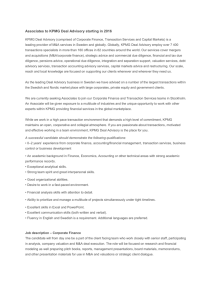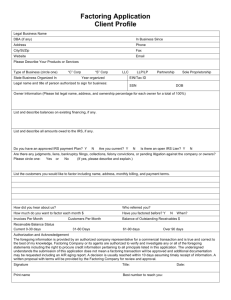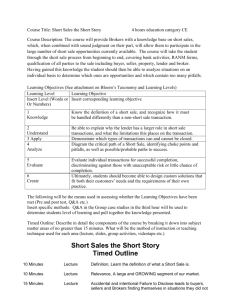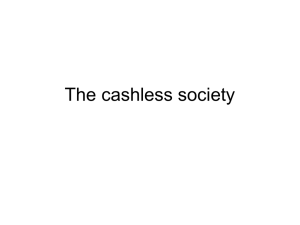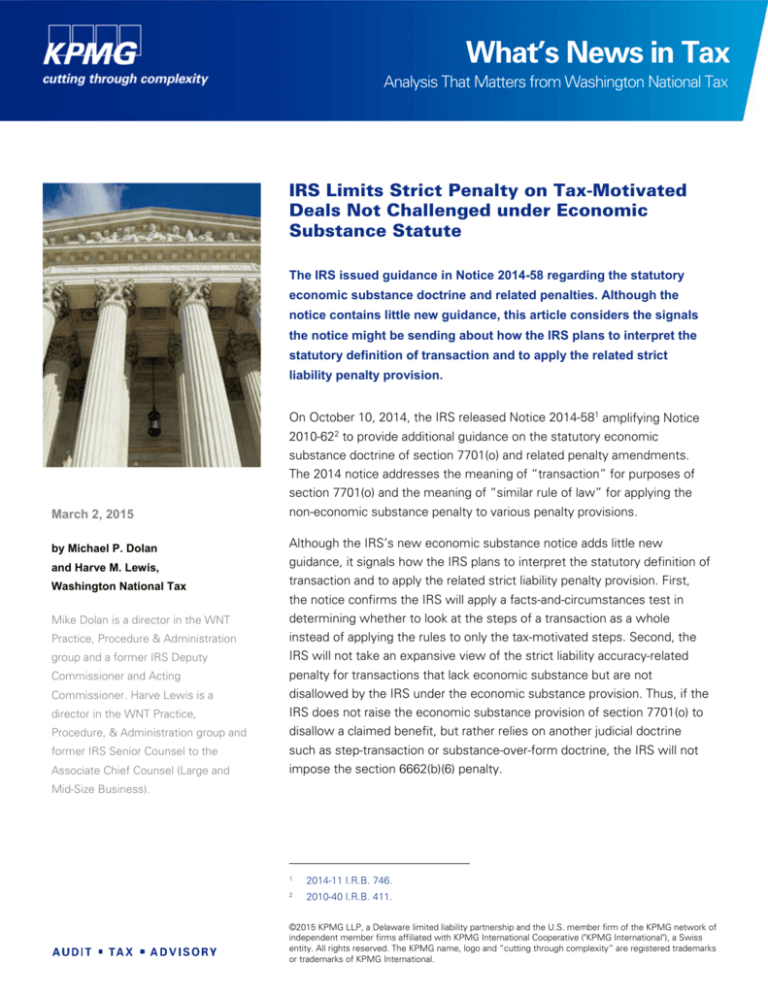
What’s News in Tax
Analysis That Matters from Washington National Tax
IRS Limits Strict Penalty on Tax-Motivated
Deals Not Challenged under Economic
Substance Statute
The IRS issued guidance in Notice 2014-58 regarding the statutory
economic substance doctrine and related penalties. Although the
notice contains little new guidance, this article considers the signals
the notice might be sending about how the IRS plans to interpret the
statutory definition of transaction and to apply the related strict
liability penalty provision.
March 2, 2015
by Michael P. Dolan
and Harve M. Lewis,
Washington National Tax
Mike Dolan is a director in the WNT
Practice, Procedure & Administration
group and a former IRS Deputy
Commissioner and Acting
Commissioner. Harve Lewis is a
director in the WNT Practice,
Procedure, & Administration group and
former IRS Senior Counsel to the
Associate Chief Counsel (Large and
On October 10, 2014, the IRS released Notice 2014-581 amplifying Notice
2010-622 to provide additional guidance on the statutory economic
substance doctrine of section 7701(o) and related penalty amendments.
The 2014 notice addresses the meaning of “transaction” for purposes of
section 7701(o) and the meaning of “similar rule of law” for applying the
non-economic substance penalty to various penalty provisions.
Although the IRS’s new economic substance notice adds little new
guidance, it signals how the IRS plans to interpret the statutory definition of
transaction and to apply the related strict liability penalty provision. First,
the notice confirms the IRS will apply a facts-and-circumstances test in
determining whether to look at the steps of a transaction as a whole
instead of applying the rules to only the tax-motivated steps. Second, the
IRS will not take an expansive view of the strict liability accuracy-related
penalty for transactions that lack economic substance but are not
disallowed by the IRS under the economic substance provision. Thus, if the
IRS does not raise the economic substance provision of section 7701(o) to
disallow a claimed benefit, but rather relies on another judicial doctrine
such as step-transaction or substance-over-form doctrine, the IRS will not
impose the section 6662(b)(6) penalty.
Mid-Size Business).
1
2014-11 I.R.B. 746.
2
2010-40 I.R.B. 411.
©2015 KPMG LLP, a Delaware limited liability partnership and the U.S. member firm of the KPMG network of
independent member firms affiliated with KPMG International Cooperative ("KPMG International"), a Swiss
entity. All rights reserved. The KPMG name, logo and “cutting through complexity” are registered trademarks
or trademarks of KPMG International.
IRS Limits Strict Penalty on Tax-Motivated Deals Not Challenged under Economic Substance Statute
page 2
Background
The courts have developed several judicial doctrines to disallow tax
benefits from tax-motivated transactions satisfying the literal requirements
of specific tax provisions. One of these is the economic substance
doctrine. Because the courts did not apply the doctrine in a uniform
manner, Congress codified the economic substance doctrine in section
7701(o)3 for transactions entered into after March 30, 2010.
Under section 7701(o), a transaction has economic substance if the
taxpayer has, apart from federal income tax effects, (1) an economic
position changed by the transaction in a meaningful way, and (2) a
substantial purpose for entering into the transaction.
Defining Transaction
Section 7701(o)(5)(D) states that a transaction “includes a series of
transactions.” The term “transaction” is defined in regulations as including
“all of the factual elements relevant to the expected treatment of any
investment, entity, plan, or arrangement,” as well as any series of steps
carried out as a part of a plan.4 According to the 2014 notice, the IRS will
generally use the reportable transaction definition of “transaction” to apply
the codified economic substance doctrine.
The 2014 notice elaborates by imposing a facts-and-circumstances test to
determine when a plan’s steps are aggregated or disaggregated in
defining a transaction. Generally, when a plan that generated a tax benefit
involved a series of interconnected steps with a common object, the
transaction is considered to include all those steps taken together—an
aggregation approach. Thus, every step in the series will be considered
when analyzing whether the transaction as a whole lacks economic
substance.
On the other hand, in some situations the IRS will use a disaggregation
approach: It will apply the economic substance doctrine only to the
individual steps in a transaction that are tax-motivated and unnecessary to
Unless otherwise indicated, section
references are to the Internal Revenue
Code of 1986, as amended (the
3
Section 1409 of the Health Care and Education Reconciliation Act of 2010, Pub. L. No.
4
Section 1.6011-4(b)(1).
“Code”) or the applicable regulations
promulgated pursuant to the Code (the
“regulations”).
111-152.
©2015 KPMG LLP, a Delaware limited liability partnership and the U.S. member firm of the KPMG network of
independent member firms affiliated with KPMG International Cooperative ("KPMG International"), a Swiss
entity. All rights reserved.
IRS Limits Strict Penalty on Tax-Motivated Deals Not Challenged under Economic Substance Statute
page 3
accomplish the non-tax goals. The disaggregation approach has been
asserted by the IRS and the Justice Department in litigation, but not
always successfully.
The legislative history of section 7701(o) provides that the codified
provision does not alter a court’s ability to “aggregate, disaggregate, or
otherwise recharacterize a transaction” when applying the economic
substance doctrine.5 The legislative history cites Coltec Industries, Inc. v.
United States,6 which took a disaggregation approach. However, the
disaggregation approach was not followed in Shell Petroleum Inc. v.
United States.7 The statute does not require a disaggregation approach,
and it is unclear how the courts will react in those cases in which the
government raises the disaggregation approach in the future.
Penalties
Section 6662(b)(6) imposes an accuracy-related penalty when any claimed
tax benefit is disallowed because a transaction either lacks economic
substance within the meaning of section 7701(o), or fails to meet the
requirements of any similar rule of law. This 20 percent penalty on any
portion of an underpayment is increased to 40 percent if the transaction is
not adequately disclosed by the taxpayer.
Section 6662(b)(6) is a strict liability provision; taxpayers cannot invoke the
reasonable cause exceptions under sections 6664(c) and 6664(d) to avoid
the penalty. In addition, if any portion of a claim for refund or credit is
denied because the claim is attributable to a non-economic substance
transaction—i.e., disallowed under a “similar rule” provision—then the
taxpayer will be treated as not having a reasonable basis with respect to
that amount and will be subject to a 20 percent penalty.
Taxpayers and tax practitioners have been concerned about which judicial
doctrines are within the scope of “any similar rule of law” for purposes of
this penalty. In a 2011 Large Business and International (“LB&I”)
directive,8 LB&I professionals were instructed that, until further notice, the
5
House Budget Report No. 111-443(i) at 296-7; Joint Committee on Taxation Report for
6
454 F.3d 1340 (Fed Cir. 2006).
7
102 A.F.T.R. 2008-5008 (D.C. Tex 2008), 2008-2 U.S.T.C. ¶ 50,422.
8
LB&I 4-0711015 (July 15, 2011).
the Revenue Reconciliation Act of 2010, JCX-18-10, at 153.
©2015 KPMG LLP, a Delaware limited liability partnership and the U.S. member firm of the KPMG network of
independent member firms affiliated with KPMG International Cooperative ("KPMG International"), a Swiss
entity. All rights reserved.
IRS Limits Strict Penalty on Tax-Motivated Deals Not Challenged under Economic Substance Statute
page 4
penalty should only be imposed for failure to meet the economic
substance provisions of section 7701(o); the penalty was not to be
imposed because of the application of any similar rule of law or judicial
doctrine such as the step transaction, substance over form, or sham
transaction doctrines. The directive stated, however, that it was not an
official pronouncement of law, and could not be used, cited, or relied
upon.
The 2014 notice clarifies that “any similar rule of law” means a rule or
doctrine that applies the same factors and analysis required under section
7701(o) for an economic substance analysis, even if a different term or
terms—for example, “sham transaction doctrine”—are used to describe
the rule or doctrine. The notice differs from the directive by stating that
the penalty could apply to a transaction disallowed because of the sham
transaction doctrine if the factors and analysis applied were the same as
those under section 7701(o). Moreover, the notice provides that if the IRS
does not raise section 7701(o) to disallow the claimed tax benefit but
disallows it using other judicial doctrines, such as substance over form or
step transaction doctrine, the IRS will not treat the transaction as failing to
meet the requirements of a similar rule of law for penalty purposes.9
Accordingly, if a taxpayer’s claimed benefits are disallowed under a judicial
doctrine not considered a similar rule of law, the strict liability aspect of
section 6662(b)(6) would not apply. The taxpayer may seek relief for
reasonable cause under section 6664(c) (or section 6664(d) if applicable) or
establish a reasonable basis for purposes of section 6676.
The notice is effective for transactions entered into after March 30, 2010,
so it supplants the advice in the directive as to what is “any similar rule of
law.”
Conclusion
The notice provides little new guidance on what constitutes a transaction
for purposes of section 7701(o). Although the notice takes a different
9
At a D.C. Bar luncheon on January 22, 2015, Treasury tax legislative counsel Thomas
West stated that a “sham transaction” is a similar rule of law for purposes of the penalty
only if the same two-prong test, the transaction has to have economic substance and a
substantial business purpose, and was not intended to include the sham transaction
doctrine. 2015 TNT 15-2 (Jan. 22, 2015) (Doc 2015-1685).
©2015 KPMG LLP, a Delaware limited liability partnership and the U.S. member firm of the KPMG network of
independent member firms affiliated with KPMG International Cooperative ("KPMG International"), a Swiss
entity. All rights reserved.
IRS Limits Strict Penalty on Tax-Motivated Deals Not Challenged under Economic Substance Statute
page 5
position from the directive and includes “sham transaction doctrine”
within what constitutes “any similar rule of law” for purposes of section
6662(b)(6), it is generally ameliorative. Importantly, taxpayers may rely on
the notice to assert that for purposes of section 6662(b)(6) and related
penalty provisions, other judicial doctrines (such as substance over form
and step transaction) that do not rely on the same factors and analysis as
section 7701(o) do not fall within a similar law or rule.
What's News in Tax is a publication
from the Washington National Tax
practice of KPMG LLP (“KPMG”)
that contains thoughtful analysis of
new developments and practical,
relevant discussions of existing
rules and recurring tax issues.
The information contained in this article is of a general nature and based on authorities that are subject
to change. Applicability of the information to specific situations should be determined through
consultation with your tax adviser.
This article represents the views of the author or authors only, and does not necessarily represent the
views or professional advice of KPMG LLP.
©2015 KPMG LLP, a Delaware limited liability partnership and the U.S. member firm of the KPMG network of
independent member firms affiliated with KPMG International Cooperative ("KPMG International"), a Swiss
entity. All rights reserved.


